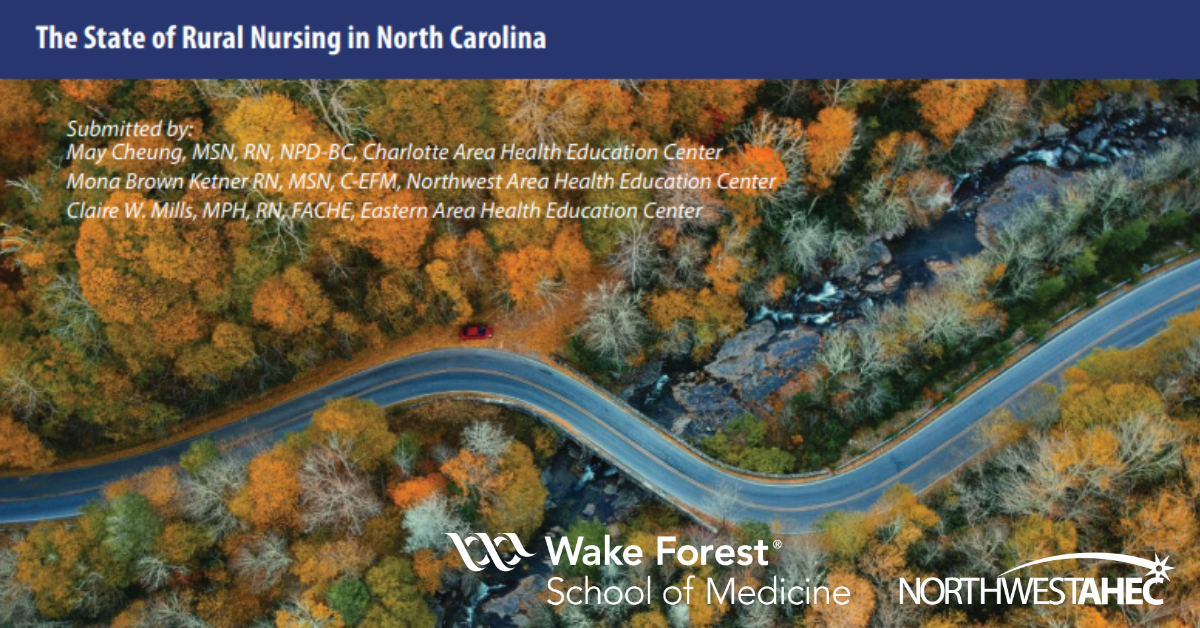
Submitted by:
May Cheung, MSN, RN, NPD-BC, Charlotte Area Health Education Center
Mona Brown Ketner RN, MSN, C-EFM, Northwest Area Health Education Center
Claire W. Mills, MPH, RN, FACHE, Eastern Area Health Education Center
The North Carolina AHEC (Area Health Education Center) mission is to provide and support educational activities and services with a focus on primary care in rural communities and those with less access to resources to recruit, train and retain the workforce needed to create a healthy North Carolina.
NC AHEC strives to meet the educational needs of healthcare providers as well as preparing them to deliver high quality care in rural and underserved areas and communities. The County Development Tier Designation 2020 data reveals that 40 of the 100 counties in NC are
considered Tier 1 (most distressed counties); 40 counties are considered Tier 2; and 20 counties are considered Tier 3 (least distressed) (North Carolina Department of Commerce, 2020). What do this all mean? Tier rankings are calculated based on the average unemployment rate, median household income, percent growth in population, and adjusted property base per capita. A low tier number
indicates a county that is distressed, whereas a high tier number indicates a county that is not distressed. Distressed counties may exhibit low employment rates, lower household incomes, population growth that is slow or stagnant, and a low property base per capita (North Carolina Department of Commerce, 2020).
Approximately 40% of North Carolinians which is about 4 million people live in one of the 80 rural counties of NC (Knopf, T., 2018). In these rural areas, individuals have more difficulty accessing healthcare, as there are fewer hospitals and healthcare providers may be scarce. Most of the nurses who serve patients in these rural settings generally live in these communities and can face profound
economic challenges in their own families. These hardships can make it difficult for nurses to continue their education beyond the point at which they are licensed (Robert Wood Johnson Foundation, 2010). Access to educational opportunities is an important factor that contributes to nurse retention in rural areas. Many nurses in rural areas feel isolated and find it challenging to connect with their peers. They may also have little professional development or continuing education opportunities because of poor or non-existent internet connections, long travel times to workshops, coverage issues, or financial costs associated with professional meetings. All of these factors may lead to a sense of disconnection professionally.
The National Organization of State Offices of Rural Health designates the third Thursday of each November as National Rural Health Day, with the 2020 date being set for November 19 (National Organization of State Offices of Rural Health, 2020). The NC AHEC also recognizes the importance of this day and rural nursing. The NC AHEC Nurse Council consists of nurses from all nine Area Health Education Centers in the state of North Carolina. With funds granted through the NC AHEC Program Office, the NC AHEC Nurse Council provided a concurrent, multisite conference called The Inaugural Celebration of Rural Health Nursing on December 1, 2017 with a total of 329 The State of Rural Nursing in North Carolina participants attending across 6 sites. The 2020 Celebration of Rural Health Nursing conference will be held on Friday November 6 with continued grant funding from the NC AHEC Program Office. Due to the COVID-19 pandemic, this conference will be held via live webinar and the event will be recorded which will allow for access across the entire state.
This conference is a coordinated project among all nine NC Area Health Education Centers, focusing on emerging trends and results from a statewide nursing needs assessment. LaQuana Palmer, MPA, Program Manager for the NC Department of Health and Human Services, will join us to address the impact of the COVID-19 pandemic on the Social Determinants of Health. Dr. John
Jenkins of the Greensboro AHEC will share best practices in leveraging virtual visits – moving from a nice-tohave to a necessity. Dr. Melissa Zook, a family physician practicing cradleto-grave medicine in the Appalachian foothills of Eastern Kentucky will share her journey in becoming a 21st century country physician and healing through storytelling. Nursing contact hours will be awarded for this
conference. For more information, please visit NC AHEC at https://www.ncahec.net.
View PDF of Article Here - https://epubs.democratprinting.com/publication/?m=10612&i=665852&p=24
References
- Knopf, T. (2018, January 22). NC rural health by the numbers. https://www.northcarolinahealthnews.org/2018/01/22/n-crural-health-numbers/
- National Organization of State Offices of Rural Health. (2020). National rural health day.
https://nosorh.org/calendar-events/nrhd/ - North Carolina Department of Commerce.(2020). 2020 North Carolina development tier designations. https://files.nc.gov/nccommerce/documents/files/2020-Tiersmemo_asPublished.pdf
- Robert Wood Johnson Foundation. (2010, September 22). Rural nursing facing unique workforce challenges. https://www.rwjf.org/en/library/articles-andnews/2010/09/rural-nursing-facing-uniqueworkforce-challenges.html




